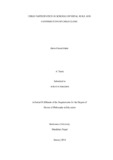
Please use this identifier to cite or link to this item:
https://hdl.handle.net/20.500.14301/257| Title: | CHILD PARTICIPATION IN SCHOOLS OF NEPAL: ROLE AND CONTRIBUTION OF CHILD CLUBS |
| Authors: | Dahal, Bhola Prasad |
| Citation: | Dahal,B.P.(2014).Child participation in schools of Nepal: Role and contribution of child clubs. |
| Issue Date: | Jan-2014 |
| School: | SOED |
| Department: | DODE |
| Level: | Ph.D. |
| Program: | PhD in Development Education |
| Abstract: | This research aims to study the child participation in schools in Nepal and role and contribution made by child clubs in enhancing children’s learning and school governance. The focus was to explore the various contexts underpinning the emergence and management of child clubs. Since the conceptual premise of children and their clubs essentially signifies the understanding of children as ‘human beings’ and childhood as a ‘social construct’, children’s childhood experiences are diverse and thus, influenced by the perceptions, values, beliefs and mindset of people in the society. In this context, in order to obtain in-depth, relevant, and rich responses to the research questions, I explored numerous pertinent literatures such as books, journals, research reports, policy documents in the beginning, and subsequently reviewed study relevant theories, concepts, empirical findings and policy matters. Moving towards research methodology, I chose qualitative research method and an interpretative paradigm, wherein, I subscribed the ontological philosophy that interprets reality as an individual’s own perceptions, and epistemologically accepts inter-personal discourse in generating knowledge. I purposively selected three schools/clubs of Sindhupalchok as the main study area, and one child club of Lalitpur district for tools development and piloting purpose. I have employed multiple tools, multiple participants and multiple sources for data collection like case study and observation (3 schools/clubs), interactive interview (15 persons), focus group discussion (8) and review of documents. I further coded, thematically analyzed, and interpreted the empirical data with reflexivity of research participants. They include students, child club leaders, teachers, and parents including SMC and PTA members, NGO activists, child rights officers, and education officers. Although there is an understanding that children are human beings ii and competent actors for social transformation and learning in respective schools, NGO activists and government officials still feel children need guidance and support from adults to develop them as future human beings. However, there is a contradiction on beliefs and values among children and adults stakeholders of child clubs in line with pre-sociological and sociological studies of childhood respectively. Hence, the ideas of new sociological studies of childhood prevails among research participants that children’s participation is important in all matters that are of interest to children, and simultaneously influencing the decision making process thereafter, that affect them in both explicit and implicit terms where there is a legend that child club meant child’s active participation and learning. It further asserts that every child is entitled to have a say on the issues of affecting them, and for their views that needs consideration based on their age and maturity. School-based-child-clubs have emerged in Nepal since 1993 to meet three goals i.e. make school child friendly, promote the citizenship rights of children, and increase children’s learning competencies and abilities in line with the UNCRC articles 12, 13, 14, 15, and 17 that holds the State Party legally responsible. The research findings, therefore, revealed that the school based child clubs have become good forums for both girls and boys to get information on children’s rights and other related issues, to develop their personal, social, and leadership skills that also promotes socialization and children’s participation in school governance. Here, children themselves initiated to lead, manage, and implement the club activities and programmes. These clubs have brought positive changes in children, their families, schools and societies. Hence, children’s agency is increasingly recognized and promoted in both schools and society. Furthermore, child clubs have provided a space for both girls and boys to meet, to express views, to plan and implement action initiatives together on issues affecting iii them. Thus, turning children into social change agents who are able to make adults and institutions more accountable and responsive towards children by informing, promoting and protecting children’s rights in schools is significant. Therefore, child club members are raising their voices, making choices, and claiming their rights collectively to improve competency and learning along with school governance. There are also few concerns among adults about child clubs that they only prioritized extracurricular activities, not on improving learning and socialization. Children of child clubs also blame child rights agencies for not supporting the needs, priorities and agenda of children and schools. Girls also feel that their voices on child clubs’ activities less prioritized, whereas non-members have frustrations that child clubs only support its members, not to all students, especially from lower grades. Supporting existing socio-cultural and economic forces (Fletcher, 2005; O’Kane, 2006), my research findings suggest that personal, political and pedagogical forces in schools also play both positive and negative roles in child clubs and child participation. When these forces are positive, they enable children to gain access to the multiple assets like ‘agency’, ‘belonging’, and ‘competency’ as asserted by Mitra (2004). In addition, I claim that children also get access to and practice ‘democracy’ and ‘empowerment’ in child clubs of South Asia. Together, these five assets “ABCDE” are fundamental for children to live a dignified life as ‘human beings’, not as ‘human becomings’ and practice their citizenship in both schools and respective communities. Key words: child rights, child participation, children’s learning and school governance |
| URI: | https://hdl.handle.net/20.500.14301/257 |
| Appears in Collections: | Theses |
Files in This Item:
| File | Description | Size | Format | |
|---|---|---|---|---|
| 2014-02-08~Bhola Thesis Final@Final Draft after ~APA.pdf | 2.46 MB | Adobe PDF |  View/Open |
Items in DSpace are protected by copyright, with all rights reserved, unless otherwise indicated.